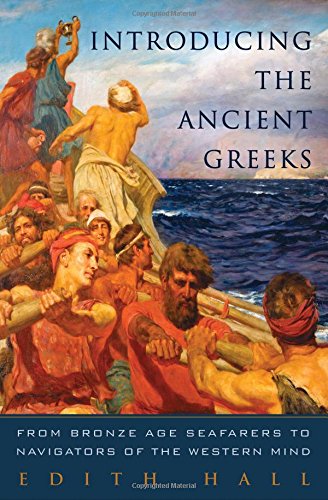
Introducing the Ancient Greeks
From Bronze Age Seafarers to Navigators of the Western Mind
کتاب های مرتبط
- اطلاعات
- نقد و بررسی
- دیدگاه کاربران
نقد و بررسی

April 14, 2014
British classicist Hall (The Return of Ulysses) has composed a panorama of two millennia of Hellenic history, depicting Greeks as sea lovers who “felt trapped when they were far inland.” Starting with the Minoan and Mycenaean thalassocracies (a political system based on sea domination), Hall embarks on an odyssey toward the four long poems of Homer and Hesiod that offer “unforgettable scenes of fighting, sailing, and farming,” pausing to appreciate the three essential crops—“grains, vines, and olives”—at the heart of Greek identity. The meandering tour features a Who’s Who of Greek thinkers: scientists Thales and Anaximander; Heraclitus, first philosopher; Xenophanes of Colophon, “first skeptic”; Parmenides, founder of ontology; Zeno and his paradoxes; atomic theorist Democritus; comparative anthropologist Hecataeus; and Herodotus, historian and “Father of European Prose.” Greece’s “apex of creativity” in democratic Athens during the fifth and fourth centuries B.C.E. segues to the marching Argeads of Macedonia under Alexander the Great, who bequeathed his world empire “to the strongest.” Hall limns how the Greeks “colonized the minds of their Roman masters,” since “cultural hegemony has more lasting effects than political dominance.” The prose is fluid and lambent, and though chapters are lengthy, readers will welcome the volume’s accessibility. Maps & illus.

























دیدگاه کاربران